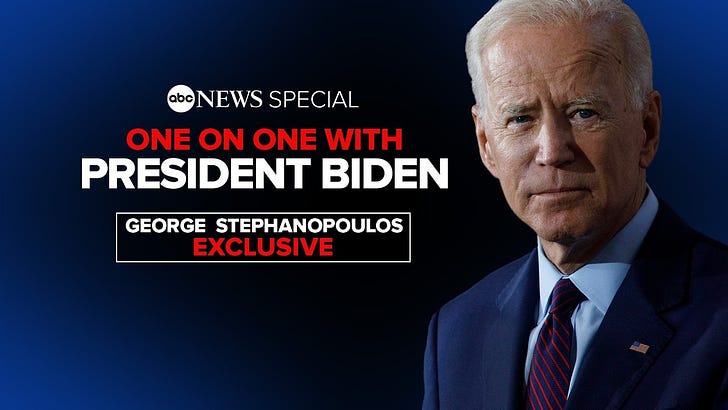President Joe Biden’s Friday interview with George Stephanopoulos was supposed to shore up his teetering candidacy.
It does not appear to have succeeded.
The point of the interview was to demonstrate Biden could make the case for his reelection cogently and forcefully, without a script and in a high-pressure setting -- in other words, to show that he could do what he failed to do while debating Donald Trump one week before. But neither the substance nor style of Biden’s answers on Friday night did much to dispel the doubts.
Biden’s answers were “meandering and circular,” as the New York Times put it. Biden’s voice remained soft relative to other politicians -- or to how he seemed just four years ago, when he was running against Trump the first time. It would be unfair to describe the performance as bad, but difficult to describe as good. And plenty of influential figures within the Democratic Party seem to agree.
In addition to a handful of House Democrats who have now called publicly for Biden to step aside, several more reportedly did so on a private conference call Sunday. Abigail Disney, heir to the family fortune, wants Biden to make way for a new candidate, as does actor/producer Rob Reiner. Both are longtime Democratic Party financiers.
Everybody urging Biden to step aside has been careful to say how much they admire and respect him, and to make clear they recognize how much he has accomplished. The sentiment seems genuine, and altogether appropriate.
Biden’s biggest accomplishment, the Inflation Reduction Act, is arguably the most significant piece of climate legislation in American history. It could also change the way the U.S. pays for prescription drugs. And that’s just one of the statutes that has his signature.
Pandemic relief, bipartisan legislation to fund infrastructure and finance mental health care -- all of them go on Biden’s resume, as well. And that’s to say nothing of what he’s done with regulations and appointments.
Biden’s Democratic colleagues also see Biden as a fundamentally decent, honest and patriotic public servant. (Most of Biden’s Republican counterparts feel the same way, though they rarely say so publicly.) In praising Biden as much as they have, these Democrats are hoping Biden comes around to their view -- that he has served his country honorably, leading it through a difficult period, and that it’s time to pass the torch. (#PassTheTorch is already a hashtag on X/Twitter.)
But Biden on Friday night made clear he sees things differently.
He and Stephanopoulos spent a big chunk of the 22-minute interview arguing about polls and the state of the race. Stephanopoulos kept pointing to surveys that showed Biden trailing by 2 to 6 points nationally; Biden kept insisting the polls were misleading and that the race was still a toss-up. (I wrote about those exchanges here.)
Some Biden critics think his stubborn answers were another sign of declining capacity. My guess is that he’s just seeing what he wants to see and hearing what he wants to hear, which is what politicians of all ages and capacities do. Either way, Biden had a valid point when he said polls are sometimes wrong, especially nowadays given the difficulties of reaching people on cell phones.
The problem is that 72% of voters in a CBS poll just said they no longer believe he has the cognitive and mental abilities to serve as president. That’s a huge margin, way beyond a sampling error. Other polls have produced similar results.
In any event, polling error can run in two directions. If it’s possible Biden is doing better than most the head-to-head surveys suggest, it’s also possible he’s doing worse. I’ve seen no evidence to suggest error is more likely to favor Biden.
It’s true that voters have plenty of doubts about Trump too, which is why Biden could still win in November. But the Democratic calculus for sticking with Biden this year was always that he was the best alternative, or at least the surest one. Now that calculus has changed.
The Democrats (and activists and editorialists) urging Biden to step aside don’t want Trump to win, as their critics suggest. They want Trump to lose. And they’ve changed their minds about how to accomplish that.
What Comes Next
Democrats are already talking about what comes next. Should they try to rally quickly around a successor, or have what amounts to an open audition for delegates? These conversations are taking place in public and in private, and it’s not yet clear how they will turn out.
But however the process unfolds, the most likely outcome is that Vice President Kamala Harris becomes the nominee. She’s got stature and she’s been tested on the national stage. She would also have seamless access to Biden-Harris funds and infrastructure in the general election, which is no small thing.
Democratic leaders seem increasingly ok with that prospect, certainly more than they did a few months ago when so many were citing the perils of a Harris candidacy as a reason Biden should seek a second term. I understand why.
I’ve said before I think Harris’ poor reputation as a politician is out of proportion to anything she has said or done. I’m even more convinced of that after spending some time last week looking at a key episode from her 2020 campaign that was more complex than commonly remembered -- and that showcases both her weaknesses as a politician but also her strengths.
You can read my article on that Harris campaign episode here.
At the very least, it’s easy to imagine Harris using speeches, interviews and debates to improve her public standing, or to force more scrutiny on Trump and his record. The same goes for other plausible contenders.
It’s tough to say the same thing about Biden, which is so many Democratic leaders with real affection for him want him to stand aside — and why he may have run out of chances to change their minds.



